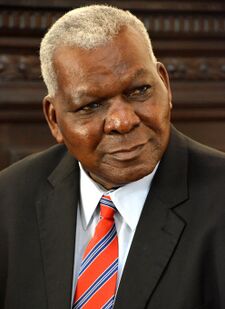Magnus Broekhaar
Magnus Broekhaar | |
|---|---|
 Broekhaar in 2019 | |
| Chairman of the Workers' Party of Hevatia | |
| Assumed office 7 June 2003 | |
| Preceded by | Naud Hekkelman |
| President of Hevatia | |
| Assumed office 13 August 2003 | |
| Prime Minister | Teun de Hoop Mathijn van Brakel Nard Klosters Jochum Wallink |
| Preceded by | Naud Hekkelman |
| Personal details | |
| Born | Magnus Marcel Broekhaar 19 November 1939 Zonnehof, Hevatia |
| Political party | Workers' Party of Hevatia |
| Spouse | Madelien Arends (m. 1970) |
| Children | 3–4 |
| Residence | Revolutionary Hall |
| Education | University of Tijakia |
| Military service | |
| Allegiance | |
| Branch/service | Hevatian People's Army |
| Years of service | 1960–1970 |
| Rank | Corporal First Class |
Magnus Marcel Broekhaar (born 19 November 1939) is a Hevatian politician serving as Chairman of the Workers' Party of Hevatia and President of Hevatia since 2003.
Broekhaar was born in Zonnehof in 1939 to Sander Broekhaar, a wealthy financier of the socialist revolution. He joined the Hevatian People's Army in 1960 and rose through the ranks until his honourable discharge in 1970. He joined the Workers' Party of Hevatia (HAP) and was appointed party secretary for Ubaral province in 1975 on account of his father's connections. He was added to the National Political Affairs Commission in 1978, the Party Secretariat in 1980, and the Politburo in 1985.
Positing himself as a reformer, Broekhaar gained the confidence of then-leader Naud Hekkelman, who appointed him as Prime Minister in 1998. Hekkelman's ailing health saw his replacement by Broekhaar as Chairman of the HAP in 2003. He became President of Hevatia after Hekkelman's death later that year.
Broekhaar reneged on his reformist ambitions and centralized institutional power. He purged his political rivals under an anti-corruption guise, tightened the planned economy, enlarged the armed forces, and started developing a cult of personality. His aggressive foreign policy resulted in two more successful nuclear weapons tests conducted by Hevatia, drawing global ire and increased economic sanctions.
Broekhaar has been accused of worsening the already-grim human rights situation in Hevatia. Those critical of him or the regime are usually subject to imprisonment, exile, torture, or execution, and collective punishment is often used. There are no free and fair elections, all media is controlled by the state, and emigration from the country is highly-restricted. The government operates an extensive network of concentration camps to punish dissent, which Broekhaar has been accused of expanding. Broekhaar, his family, and his inner circle have been targeted by international sanctions and travel bans.